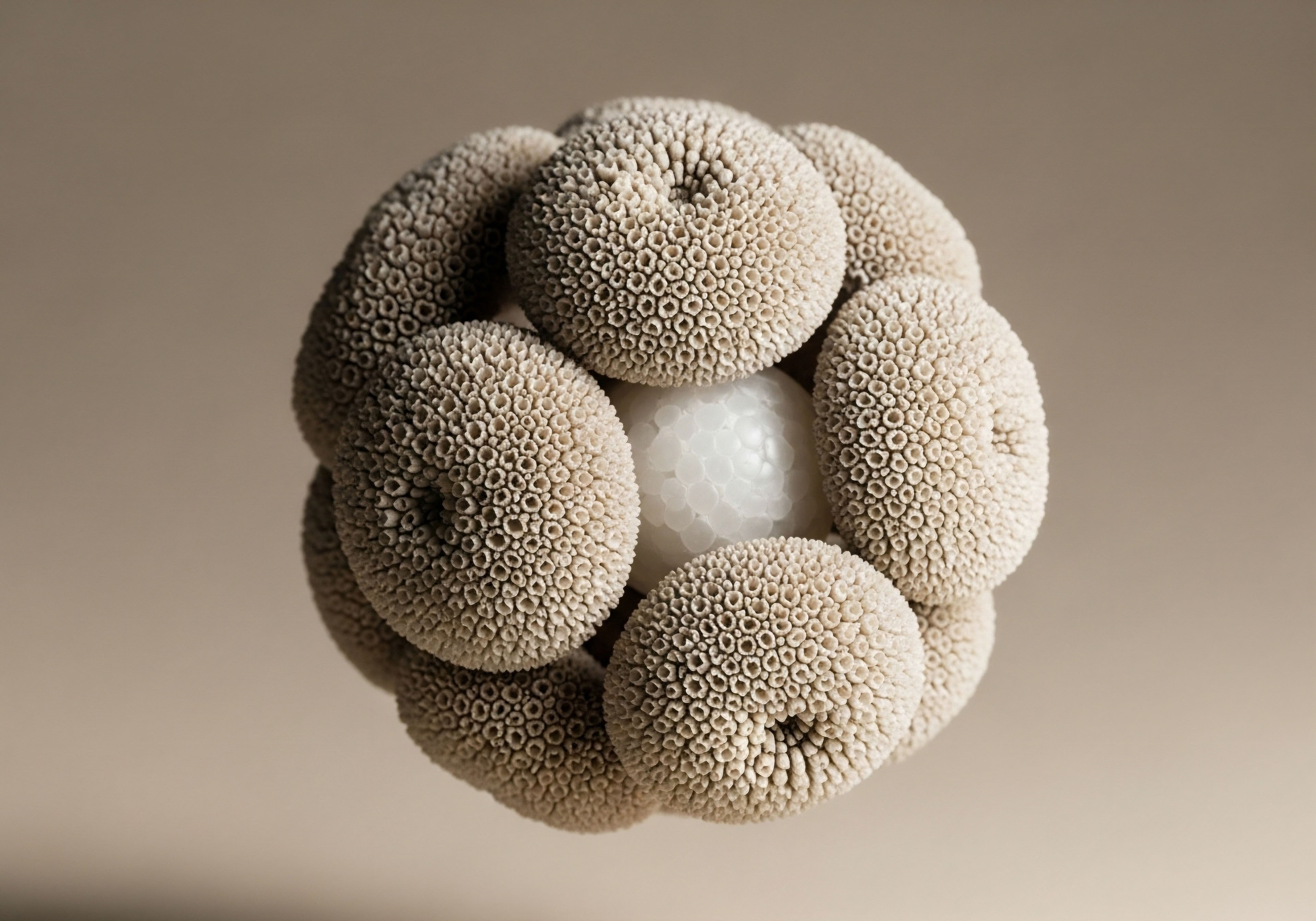

Fundamentals
Have you ever felt a subtle shift in your body’s rhythm, a quiet discord that whispers of something amiss, even when conventional tests return within normal ranges? Perhaps your menstrual cycles have become unpredictable, or the vitality you once knew seems to have dimmed, leaving you with a persistent sense of unease.
These experiences are not merely isolated incidents; they are often signals from an intricate internal messaging system, indicating a deeper conversation happening within your biological landscape. Understanding these signals is the first step toward reclaiming your inherent balance and function.
Our bodies operate through a complex network of communication, with hormones acting as vital messengers. Among the most influential players in this symphony of internal regulation is the thyroid gland, a small, butterfly-shaped organ located at the base of your neck.
This gland produces hormones, primarily thyroxine (T4) and triiodothyronine (T3), which orchestrate a vast array of bodily functions, from metabolism and energy production to heart rate and body temperature. When the thyroid’s function is compromised, its widespread influence can create ripples throughout the entire system, affecting areas seemingly unrelated at first glance, such as reproductive health.

The Body’s Internal Protectors
Within this sophisticated biological framework, our immune system stands as a vigilant guardian, designed to protect us from external threats like bacteria and viruses. Occasionally, however, this protective mechanism can misidentify parts of our own body as foreign invaders. When this occurs in relation to the thyroid gland, the immune system produces specific proteins known as thyroid antibodies.
These antibodies are not inherently harmful in their presence alone, but they serve as markers, indicating an autoimmune process is underway. Two primary types of thyroid antibodies are frequently observed:
- Thyroid Peroxidase Antibodies (TPOAb) ∞ These antibodies target the enzyme thyroid peroxidase, which is essential for the production of thyroid hormones. Their presence is a strong indicator of autoimmune thyroid conditions, such as Hashimoto’s thyroiditis.
- Thyroglobulin Antibodies (TgAb) ∞ These antibodies are directed against thyroglobulin, a protein that stores thyroid hormones. While less specific than TPOAb, their presence also points to an autoimmune attack on the thyroid gland.
The detection of these antibodies signifies that the immune system is actively engaging with the thyroid, potentially leading to inflammation and cellular damage over time. This immune activity can disrupt the delicate equilibrium of thyroid hormone production, leading to either an underactive thyroid (hypothyroidism) or, less commonly, an overactive thyroid (hyperthyroidism).
Thyroid antibodies signal an immune system interaction with the thyroid, potentially disrupting hormone balance and affecting overall well-being.

Beyond the Thyroid Gland
While thyroid antibodies directly impact thyroid function, their influence extends far beyond this single gland. The endocrine system operates as a deeply interconnected web, where changes in one area inevitably influence others.
The presence of thyroid antibodies, even in individuals whose thyroid hormone levels appear to be within the conventional “normal” range, can still exert a subtle yet significant impact on other hormonal axes, particularly those governing reproduction. This is where the story becomes particularly relevant for those experiencing unexplained reproductive challenges.
The connection between thyroid autoimmunity and reproductive health is a subject of ongoing clinical investigation. It is not simply about overt thyroid dysfunction; the very presence of these immune markers suggests a broader immune dysregulation that can interfere with the intricate processes required for optimal reproductive function.
This includes the delicate dance of hormones that regulate menstrual cycles, ovulation, and the very ability to conceive and sustain a pregnancy. Understanding this deeper connection is vital for anyone seeking clarity on their reproductive journey.


Intermediate
The intricate relationship between thyroid antibodies and reproductive hormones extends beyond simple cause and effect, revealing a complex interplay within the endocrine system. When thyroid antibodies are present, even without overt thyroid dysfunction, they can create a subtle yet persistent immunological environment that impacts the delicate balance required for optimal reproductive health. This section explores the specific ways these antibodies influence reproductive hormones and outlines clinical considerations for managing these interactions.

How Do Thyroid Antibodies Influence Ovarian Function?
The presence of thyroid antibodies, particularly TPOAb and TgAb, is frequently associated with autoimmune thyroid conditions like Hashimoto’s thyroiditis. This autoimmune activity can indirectly affect ovarian function through several pathways. The thyroid hormones themselves, T3 and T4, play a fundamental role in regulating the menstrual cycle, supporting ovulation, and preparing the uterine lining for implantation. When thyroid function is compromised, even subtly, by an autoimmune process, it can disrupt these critical reproductive steps.
One significant impact involves the hypothalamic-pituitary-gonadal (HPG) axis, the central command center for reproductive hormone regulation. Thyroid hormone imbalances, whether due to overt dysfunction or the more subtle effects of autoimmunity, can interfere with the pulsatile release of gonadotropin-releasing hormone (GnRH) from the hypothalamus. This, in turn, affects the pituitary gland’s secretion of follicle-stimulating hormone (FSH) and luteinizing hormone (LH), both of which are essential for ovarian follicle development and ovulation.
Beyond the HPG axis, thyroid antibodies may also contribute to a state of chronic inflammation or immune dysregulation that directly affects the ovaries. Some theories suggest a direct infiltration of reproductive organs by thyroid antibodies or a co-existence with other autoimmune conditions that target ovarian tissue. This can lead to:
- Irregular Menstrual Cycles ∞ Fluctuations in thyroid hormone levels, even within the normal range, can cause anovulation or irregular periods, making conception more challenging.
- Reduced Ovarian Reserve ∞ Studies indicate a potential association between thyroid autoimmunity and lower levels of Anti-Müllerian Hormone (AMH) and reduced antral follicle count (AFC), markers of ovarian reserve. This suggests a possible accelerated decline in egg quantity.
- Impaired Egg Quality ∞ The inflammatory environment associated with autoimmunity might negatively affect the quality and maturation of oocytes, impacting fertilization and embryo development.
Thyroid antibodies can disrupt ovarian function by influencing the HPG axis, leading to irregular cycles and potentially affecting egg quality and ovarian reserve.

Thyroid Antibodies and Pregnancy Outcomes
The influence of thyroid antibodies extends significantly into pregnancy outcomes. The presence of TPOAb and TgAb has been consistently linked to an increased risk of adverse events, even in women who are euthyroid (have normal thyroid hormone levels). This heightened risk includes:
- Increased Miscarriage Risk ∞ Women with thyroid autoimmunity face a significantly higher likelihood of early pregnancy loss, with some studies indicating a 2- to 4-fold increased risk. The exact mechanism remains under investigation, but it may involve impaired implantation or immunological rejection of the embryo.
- Preterm Birth ∞ There is also an elevated risk of delivering prematurely for women with thyroid autoantibodies.
- Impaired Implantation and Endometrial Receptivity ∞ The immune dysregulation associated with thyroid antibodies can interfere with the uterus’s ability to accept and nourish an embryo, leading to implantation failures.
The challenge in managing these risks lies in the fact that conventional thyroid hormone supplementation (levothyroxine) has not consistently shown to prevent adverse pregnancy outcomes in euthyroid women with thyroid autoimmunity. This highlights the need for a more comprehensive approach that considers the underlying immune imbalance.

Clinical Protocols and Hormonal Optimization
Addressing the impact of thyroid antibodies on reproductive hormones often requires a personalized strategy that extends beyond simply managing thyroid hormone levels. For individuals experiencing symptoms related to hormonal changes, particularly those with detected thyroid antibodies, a broader perspective on endocrine system support becomes essential.

Testosterone Replacement Therapy for Women
For women experiencing symptoms such as low libido, persistent fatigue, or mood changes, even with normal thyroid function but in the presence of thyroid antibodies, assessing other hormonal axes is vital. Testosterone Replacement Therapy (TRT) for women can be a consideration, particularly in peri-menopausal and post-menopausal stages, or when symptoms of low testosterone are present.
Protocols for women typically involve low-dose administration to restore physiological levels. This might include:
- Testosterone Cypionate ∞ Administered weekly via subcutaneous injection, typically in small doses (e.g. 10 ∞ 20 units or 0.1 ∞ 0.2ml). This method allows for precise dosing and titration.
- Progesterone ∞ Often prescribed alongside testosterone, especially for women in peri-menopause or post-menopause, to support uterine health and overall hormonal balance.
- Pellet Therapy ∞ Long-acting testosterone pellets can offer a consistent release of the hormone, reducing the frequency of administration. Anastrozole may be used concurrently if there is a tendency for excessive testosterone conversion to estrogen.
The goal of such hormonal optimization is to restore a sense of vitality and function, recognizing that reproductive hormones do not operate in isolation but are part of a larger, interconnected system that can be influenced by immune status.

Testosterone Replacement Therapy for Men
While the focus often falls on female reproductive health, thyroid dysfunction and autoimmunity can also affect male fertility. Hyperthyroidism, for instance, has been linked to reduced sperm count. For men experiencing symptoms of low testosterone, such as decreased libido, fatigue, or reduced muscle mass, Testosterone Replacement Therapy (TRT) can be a consideration.
A standard protocol for men often involves:
- Testosterone Cypionate ∞ Weekly intramuscular injections (e.g. 200mg/ml) are a common approach.
- Gonadorelin ∞ Administered twice weekly via subcutaneous injections, this peptide helps maintain natural testosterone production and preserves fertility by stimulating the pituitary gland.
- Anastrozole ∞ An oral tablet taken twice weekly, this medication helps manage estrogen conversion, which can be a side effect of testosterone administration.
- Enclomiphene ∞ This medication may be included to further support LH and FSH levels, particularly for men concerned with fertility preservation.
These protocols aim to restore hormonal balance, which can indirectly support overall well-being and reproductive potential, even when thyroid antibodies are present.

Post-TRT or Fertility-Stimulating Protocols for Men
For men who have discontinued TRT or are actively trying to conceive, specific protocols are designed to stimulate endogenous testosterone production and support fertility. These often include a combination of agents:
- Gonadorelin ∞ Continues to stimulate the pituitary for LH and FSH release.
- Tamoxifen ∞ A selective estrogen receptor modulator that can increase gonadotropin secretion.
- Clomid (Clomiphene Citrate) ∞ Another selective estrogen receptor modulator that stimulates FSH and LH release, promoting testicular function.
- Anastrozole (optional) ∞ May be used to manage estrogen levels if they are elevated, which can suppress natural testosterone production.
These interventions underscore the principle that hormonal systems are dynamic and can be recalibrated with targeted support, even in the context of underlying immune challenges.

Growth Hormone Peptide Therapy
Beyond direct reproductive hormones, other peptides can support overall metabolic function and cellular repair, which indirectly benefits hormonal health. Growth Hormone Peptide Therapy, using agents like Sermorelin, Ipamorelin / CJC-1295, Tesamorelin, Hexarelin, and MK-677, can be considered for active adults seeking anti-aging benefits, muscle gain, fat loss, and improved sleep. While not directly targeting reproductive hormones, optimizing growth hormone pathways can improve metabolic health, reduce inflammation, and enhance cellular regeneration, creating a more favorable environment for endocrine balance.
The presence of thyroid antibodies signals a need for a holistic assessment of hormonal health. By understanding the intricate connections between the thyroid, reproductive hormones, and the immune system, personalized strategies can be developed to support vitality and function.


Academic
The influence of thyroid antibodies on reproductive hormones represents a complex intersection of endocrinology, immunology, and reproductive physiology. Moving beyond the clinical observations, a deeper understanding requires dissecting the molecular and cellular mechanisms through which autoimmune thyroid disease (AITD) impacts the delicate orchestration of the reproductive axis. This academic exploration will focus on the systemic immunological dysregulation and its downstream effects on the hypothalamic-pituitary-gonadal (HPG) axis, ovarian function, and endometrial receptivity.

Systemic Immunological Dysregulation and Endocrine Interplay
The presence of thyroid antibodies, primarily thyroid peroxidase antibodies (TPOAb) and thyroglobulin antibodies (TgAb), signifies an autoimmune process, most commonly Hashimoto’s thyroiditis. This condition is characterized by a breakdown of immune tolerance, leading to a T-cell mediated destruction of thyroid follicular cells and the production of autoantibodies.
The core concept here is that this immune dysregulation is not confined to the thyroid gland; it often reflects a broader systemic immune imbalance that can perturb other endocrine glands and their signaling pathways.
The hypothalamic-pituitary-thyroid (HPT) axis and the hypothalamic-pituitary-gonadal (HPG) axis are intimately linked. Thyroid hormones (T3 and T4) are essential for the normal functioning of the HPG axis at multiple levels. T3 receptors are present in the hypothalamus, pituitary, and gonads, indicating a direct regulatory role.
Alterations in thyroid hormone signaling, even subtle ones within the “normal” range, can modify the sensitivity of GnRH neurons in the hypothalamus or alter the pituitary’s responsiveness to GnRH, thereby affecting FSH and LH secretion.
Consider the impact on prolactin. Hypothyroidism, often a consequence of Hashimoto’s, can lead to elevated prolactin levels (hyperprolactinemia). This occurs because reduced thyroid hormone feedback to the hypothalamus can increase thyrotropin-releasing hormone (TRH). TRH, in addition to stimulating TSH release, also stimulates prolactin secretion from the pituitary.
Elevated prolactin directly inhibits GnRH pulsatility, leading to suppressed FSH and LH, which in turn impairs ovarian steroidogenesis and ovulation. This feedback loop illustrates a direct neuroendocrine pathway through which thyroid dysfunction, often driven by autoimmunity, can compromise reproductive function.
Thyroid antibodies indicate systemic immune dysregulation, influencing the HPG axis and potentially elevating prolactin, thereby disrupting reproductive hormone balance.

Cellular and Molecular Mechanisms of Reproductive Impact
The direct impact of thyroid antibodies on reproductive organs and processes is a subject of ongoing research, with several hypotheses proposed:
- Direct Ovarian Infiltration ∞ Some theories suggest that thyroid antibodies or immune cells involved in the autoimmune response might directly infiltrate ovarian tissue, leading to oophoritis (inflammation of the ovaries) or accelerated follicular atresia. While direct evidence is challenging to obtain in humans, the co-occurrence of AITD with other autoimmune ovarian conditions supports this concept.
- Cross-Reactivity and Molecular Mimicry ∞ It is hypothesized that antigens on thyroid cells might share structural similarities with proteins on ovarian cells or reproductive tissues. This molecular mimicry could lead to the immune system mistakenly attacking reproductive structures after being primed against thyroid antigens.
- Cytokine-Mediated Inflammation ∞ Autoimmune conditions are characterized by an altered cytokine profile. Pro-inflammatory cytokines (e.g. TNF-alpha, IL-6) released during the autoimmune attack on the thyroid can create a systemic inflammatory environment. This inflammation can directly impair follicular development, oocyte maturation, and endometrial receptivity. For instance, inflammation in the uterine lining can disrupt the precise signaling required for successful embryo implantation.
- Oxidative Stress ∞ Chronic inflammation and autoimmune processes generate increased oxidative stress. Reactive oxygen species (ROS) can damage cellular components, including DNA, proteins, and lipids, within ovarian follicles and oocytes, thereby compromising egg quality and viability.
The effect on Anti-Müllerian Hormone (AMH) and antral follicle count (AFC), key markers of ovarian reserve, is particularly noteworthy. Several studies have indicated that women with AITD, even those who are euthyroid, may exhibit lower AMH levels and reduced AFC compared to controls. This suggests a potential impact on the quantity of remaining ovarian follicles, possibly accelerating the decline in ovarian reserve.
| Reproductive Parameter | Observed Impact with Thyroid Antibodies | Proposed Mechanism |
|---|---|---|
| Menstrual Cycle Regularity | Irregular cycles, anovulation | HPT-HPG axis disruption, altered GnRH pulsatility, hyperprolactinemia |
| Ovarian Reserve (AMH, AFC) | Reduced levels | Direct ovarian damage, accelerated follicular atresia, chronic inflammation |
| Egg Quality | Compromised maturation and viability | Oxidative stress, inflammatory cytokine environment |
| Endometrial Receptivity | Impaired implantation | Immune dysregulation, inflammatory mediators in uterine lining |
| Pregnancy Outcomes | Increased miscarriage, preterm birth | Impaired implantation, immunological rejection, relative thyroid hormone deficiency |

Therapeutic Considerations and Future Directions
The management of thyroid autoimmunity in the context of reproductive challenges is complex. While levothyroxine supplementation is standard for overt hypothyroidism, its efficacy in preventing adverse reproductive outcomes in euthyroid women with thyroid antibodies remains a subject of debate and ongoing clinical trials. This highlights that simply normalizing TSH levels may not fully address the underlying immune dysregulation.
Future research directions are increasingly focusing on immunomodulatory therapies. Strategies aimed at restoring immune tolerance or mitigating the inflammatory response could offer novel avenues for intervention. This might include:
- Targeted Immunotherapies ∞ Exploring agents that specifically modulate the immune response without broad immunosuppression.
- Nutritional and Lifestyle Interventions ∞ Addressing factors that influence immune health, such as gut microbiota balance, nutrient deficiencies, and chronic stress, which can all influence autoimmune processes.
- Peptide-Based Interventions ∞ Certain peptides, like Pentadeca Arginate (PDA), are being investigated for their tissue repair, healing, and anti-inflammatory properties. While not directly targeting thyroid antibodies, reducing systemic inflammation could indirectly benefit reproductive health.
The clinical translator’s role here is to synthesize this complex scientific understanding into actionable insights. Recognizing that thyroid antibodies are not just markers of thyroid disease but indicators of a broader immune system conversation is paramount. This perspective guides a more holistic and personalized approach to supporting reproductive health, moving beyond isolated hormone measurements to address the intricate web of biological interactions.
Understanding the deep endocrinology of thyroid autoimmunity’s impact on reproductive hormones necessitates a systems-biology perspective. It is a reminder that the body’s systems are profoundly interconnected, and true vitality arises from addressing these connections rather than focusing on isolated symptoms. This nuanced understanding allows for the development of more precise and effective personalized wellness protocols.

References
- Fertility Choices. The Connection Between Thyroid Disorders and Infertility.
- MDPI. Hashimoto’s Thyroiditis and Female Fertility ∞ Endocrine, Immune, and Microbiota Perspectives in Assisted Reproduction ∞ A Narrative Review.
- CREATE Fertility. Hyperthyroidism and fertility.
- Dr. Shiva. Thyroid-Infertility Connection ∞ Exploring How Thyroid Health Impacts Fertility.
- Frontiers. Thyroid autoimmunity and its negative impact on female fertility and maternal pregnancy outcomes.

Reflection
As you consider the intricate connections between thyroid antibodies and reproductive hormones, pause to reflect on your own health journey. This exploration is not merely an academic exercise; it is an invitation to understand the profound intelligence within your own biological systems. Every symptom, every subtle shift, holds a piece of the puzzle. The knowledge gained here serves as a compass, guiding you toward a deeper conversation with your body.
Your path to reclaiming vitality is uniquely yours, and it begins with informed self-awareness. This understanding empowers you to seek personalized guidance, to ask precise questions, and to collaborate with clinicians who view your health through a comprehensive lens. The journey toward optimal function is a continuous dialogue, one where scientific insight meets your lived experience, leading to a future of sustained well-being and uncompromised vitality.



